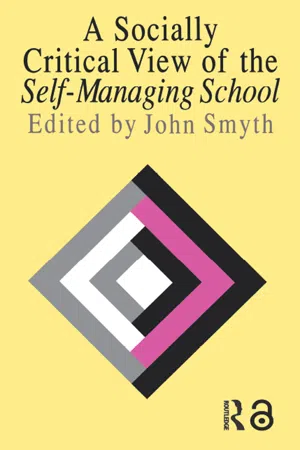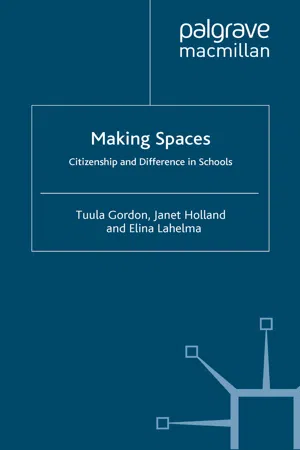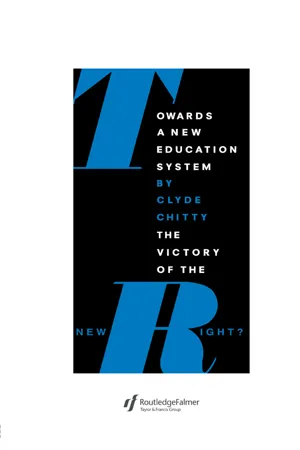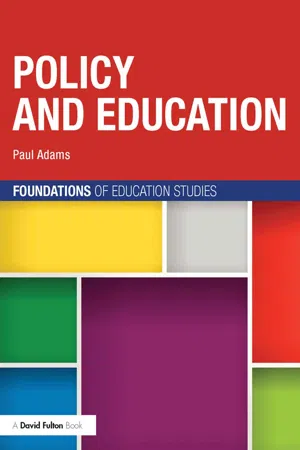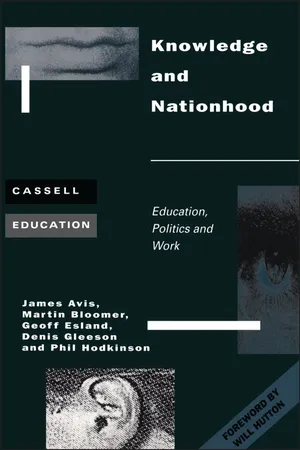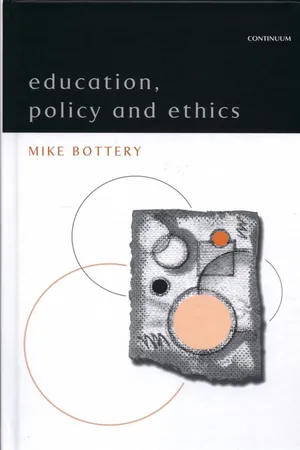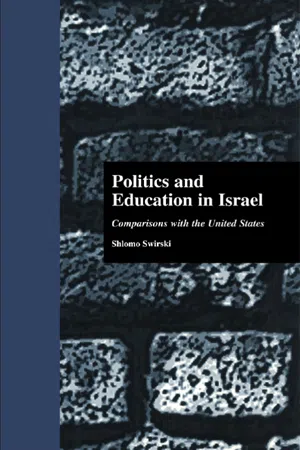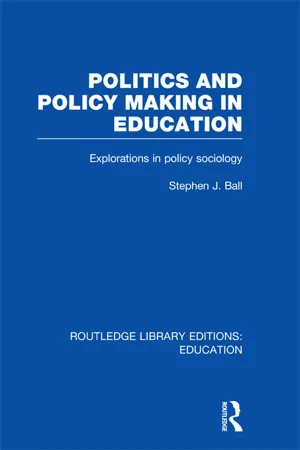Social Sciences
New Right View on Education
The New Right view on education emphasizes the importance of competition, choice, and market forces in driving educational improvement. It advocates for parental choice, school autonomy, and the introduction of market mechanisms such as vouchers and charter schools. This perspective often criticizes state control and advocates for a more decentralized approach to education.
Written by Perlego with AI-assistance
Related key terms
1 of 5
8 Key excerpts on "New Right View on Education"
- John Smyth(Author)
- 2005(Publication Date)
- Routledge(Publisher)
The term ‘New Right’ (see Bosanquet, 1983) refers not to any specific group but to a movement represented by a collection of lobby groups concerned, among other things, to bring about the ‘liberation’ of public services from ‘excessive state control’ through their ‘privatization’. The political philosophy of the New Right is that of ‘liberalism’, defined in F.A.Hayek’s sense of limiting the powers of government in the interests of the liberty of the individual and a ‘free society’. Hayek (1960) argues that contemporary liberalism is sometimes misleadingly presented as a doctrine of minimal government, where the latter limits itself to the maintenance of law and order. In fact, liberals are not necessarily opposed to government concerning themselves with social welfare or economic affairs; the important issue is the character and extent of their involvement (Hindess, 1987).As far as education is concerned, the objective of the New Right is the transformation of whole systems of national, state or local authority controlled schooling, so that most schools would become individual self-managing ‘private’ institutions. Schools would have the legal status of non-profit-making charitable trusts, much like the existing English public (i.e., private) schools. As one leading proponent of right-wing policy explains, the plan is ‘to create, as near as practicable, a “free market” in education. To use a popular term, it is in some sense to “privatise” the State education system’ (Sexton, 1987, p. 10).The New Right argues that education should be regarded as a ‘commodity’ and teachers as its ‘producers’. Hitherto, education has provided an inadequate service because it has suffered from the effects of ‘producer capture’. According to the rightwing Adam Smith Institute Omega Report, Education Policy- T. Gordon, J. Holland, E. Lahelma(Authors)
- 2000(Publication Date)
- Palgrave Macmillan(Publisher)
Educational policies have addressed these spaces thraugh redrawing the map of possibilities and limitations for individual citi- zens. Changes have taken piace in the context of New Right politics and policies; these include aredefinition of the relationship between nation states and their citizens, the chan ging significance of the boundaries of nation states, and supra-nationality. The effect of the New Right discourse in each of the countries discussed here has been to move the debate on aspects of the welfare state, including particu- larly education, to the right, and to embed notions of the market into the system. This setting of the agenda has been so effective that, despite changes of government, many of the policies and practices of the New Right have been incorpora ted by new governments in these countries. The New Right politics The New Right is an amorphous alliance of neo-conservatism and neo- liberalism. lt is a confusing, contradictory constellation (cf. Reche, 1992) which would not be of great analytical and intellectual interest, had it not been so influential in the recent development of Western societies, notably in the USA (Reaganism) and Britain (Thatcherism) and more recently in Nordic countries. The New Right has privileged education as a crucial site for the- eBook - ePub
Towards A New Education System
The Victory Of The New Right?
- Clyde Chitty University of Birmingham.(Author)
- 2017(Publication Date)
- Routledge(Publisher)
The Times Educational Supplement (17 July 1987), the main effects of the government’s proposals would be to ‘raise costs and lower efficiency’. Open enrolment signified ‘the negation of planning’. If market forces were allowed to prevail, planning would, in future, be retrospective: ‘a matter of picking up the bits and presiding over the bankruptcies after the consumers have made their educational purchases’. Once the measures were implemented, it was extremely doubtful whether it would any longer make any sense ‘to talk about a “system” at the local level’. A ‘blight’ would be put on ‘all plans for restructuring, closures and mergers’. Some regarded this as unnecessarily alarmist, but one thing agreed upon by all commentators was that the new proposals represented something of a victory for New Right pressure groups and for those in charge of the Downing Street Policy Unit.The Influence of New Right Thinking
The philosophy of the so-called New Right can be seen as one expression of the new politics which emerged in the 1970s in response to the world economic recession, the exhaustion of Fordism as a regime of accumulation and the break-down of American hegemony. The New Right encompasses a wide range of groups and ideas, and there are many internal divisions and conflicts. What the term could not be said to signify is either a unified movement or a coherent doctrine. Yet according to Gamble (1988), there are certain important beliefs which are common to all adherents of New Right philosophy:What all strands within the New Right share … is the rejection of many of the ideas, practices and institutions which have been characteristic of social democratic regimes in Europe and of the New Deal and the Great Society programmes in the United States. The New Right is radical because it seeks to undo much that has been constructed in the last sixty years. New Right thinkers question many of the assumptions which have become accepted for the conduct of public policy while New Right politicians have sought to build electoral and policy coalitions which challenge key institutions and key policies … As a political programme, the New Right is identified with opposition to state involvement in the economy. They are fierce critics of Keynesian policies of economic management and high public expenditure on welfare. But New Right politicians are also renowned as advocates of national discipline and strong defence … To preserve a free society and a free economy, the authority of the state has to be restored. (pp. 27–8) - eBook - PDF
- Paul Adams(Author)
- 2014(Publication Date)
- Routledge(Publisher)
Education and the New Right In the 1980s, as part of this New Right agenda, review and control mechanisms became com-monplace in an effort to instil an accountability culture (Henkel, 1991). This sits in contrast with the 1960s and 1970s where public services such as education were professionally led and where state control operated along persuasive rather than coercive lines. The 1980s saw the introduction of ‘objective’ evaluation driven by the key tenets of efficiency, effectiveness, per-formance and value for money; a drive towards deploying statistical measures, usually gleaned from test results, to determine whether or not education was ‘improving’. This ‘shift towards quantitative knowledge reinforced drives for certainty, for clear priorities and for conceptual-ising performance in terms of tangible outcome’ (Henkel, 1991: 134). It is important to note how the New Right more broadly and neoliberalism more specifi-cally orient the individual. Here is seen the ‘active’ citizen with rights, duties, obligations and expectations; the citizen becomes an active social and moral entrepreneur (Davies and Bansel, 2007: 252). In this way the social sits in opposition and deference to the economic; in support the economy is restructured and privatised and the labour market likewise. There is no longer a conflict between the self-interest of the economic subject and the patriotic duty of the citizen: the newly responsibilised individuals fulfil their obligation to the nation/state by pursuing economic well-being for themselves and their family, for their employer, company, business or corporation. (Davies and Bansel, 2007: 252) There is an emphasis on enterprise and the shrugging off of collective responsibility. The citizen becomes the middle class consumer. This positions the individual less favourably with regard to state intervention. - eBook - PDF
- Denis Glesson(Author)
- 1996(Publication Date)
- Continuum(Publisher)
On the one hand, the New Right has unleashed a system of unfettered free markets in capital and labour, while being unclear as to whether the enterprise is founded on the nation-state or the European Union; and on the other, it has created a highly centralized system of education and training designed to serve its national political philosophy -albeit one riven by serious contradictions. By definition, deregulated companies and financial institutions are free to follow their own agendas wherever they may lead and with whatever consequences for unemployment, while an overmanaged education system is tied to a narrow conception of national self-interest which bears a diminishing relationship to what is happening in the global economy. Simply to call on educational institutions and practitioners to raise qualification levels and to prepare young people 22 Knowledge and Nationhood for 'change' (in whatever forms that may take), while denying them the intellectual and financial resources to do so would seem to be a serious misjudgement of the problem. Education and training policies have become bound by the defensive and protectionist nationalism which underlies many of the initiatives taken by the New Right since 1979. Because education and training are part of both the economic and the cultural fabric of the nation-state, their institutions embody these contradictions more than most. On the one hand, education and training are seen as fundamental to Britain's successful accom-modation to the new global economy, but on the other, they are seen as the preservers of national identity and cultural stability. These contradictory tendencies are, to a degree, present in all public education systems. The task for the state is often one of balancing the critical and sometimes destabilizing potential of education with the necessity to reproduce in each generation internalized acceptance of society's rules and historical culture. - eBook - PDF
- Mike Bottery(Author)
- 2001(Publication Date)
- Continuum(Publisher)
This was partly because of the kinds of historic differences described above, and partly because of the outlook of those who were leading reforms in a particular country. In the UK, for instance, a key piece of educational legislation, the 1988 Reform Act, was a blend of radical New Right individualism and strong centralization. While commentators such as Gamble (1988) have argued that a strong, even autocratic state was seen as essential to enable a market consciousness to take root, this still does not fully explain the generation of a centralizing, statist and bureaucratic National Curriculum. For that, one has to invoke other explanations. One of these might be the deeply ingrained bureaucratic attitudes in Western societies (see Chapter 6). A second explanation would lie in taking note of the personalities of the Act's chief architects - 32 Education, policy and ethics Margaret Thatcher, a Prime Minister of radically liberal economic views but moral authoritarian tendencies, and Kenneth Baker, a Secretary of State for Education with conservative, almost nineteenth-century, views of a school curriculum. The failure of the New Right Movement from the 1980s into the 1990s saw an increased suspicion in the western world that New Right policies, rather than solving problems, were not only making them worse, but causing new ones as well. Global trends may have led to the greater mobility of labour, more insecurity and less stability in social life, but libertarian policies exacerbated them, eroding wider social and ethical norms. Concentration upon the self and the pursuit of personal fulfilment meant that social structures became means to these ends, and when they failed to do this, they were seen as dispensable. - eBook - ePub
Politics and Education in Israel
Comparisons with the United States
- Shlomo Swirski, Mark B. Ginsburg(Authors)
- 2002(Publication Date)
- Routledge(Publisher)
Rather, two roughly distinct trends can be distinguished. The first one is the “gray education” movement, which can best be described as a defensive movement on the part of an assertive middle class, which in the wake of state budget reductions moved in to secure their children’s class position through out-of-pocket contributions. The second trend is the “distinctive education” movement, and it represents an openly elitist move on the part of upper-middleclass parents to provide their children, within the framework of the state education system, a curriculum and an atmosphere reminiscent of the private, upper-class schools of Western gentries. It is this second trend that best fits the label of Israeli New Right; except that it was not the reincarnation of a Right of the past, but rather a new Right: a bourgeoisie that has only recently achieved the degree of power and self-confidence sufficient to institute an exclusive and highly selective schooling framework, with state compliance and state funding. What this new Right had in common with the reforms introduced in Thatcherite England and in the Reaganite United States was the open and explicit disengagement from previous policy commitments to attempt to improve the education of all members of society. The new educational agenda met with the approval of both major Israeli parties, Likkud and Labor. A third major party, the National Religious Party, also played an active role: in fact, the first grassroots steps in the new direction were taken under Likkud governments, when the minister of education was Zevulun Hammer of the National Religious Party - eBook - ePub
Politics and Policy Making in Education
Explorations in Sociology
- Stephen J. Ball(Author)
- 2012(Publication Date)
- Routledge(Publisher)
Black Paper/ Hillgate thrust, does address itself to the centre of controversies about educational practice and to a number of real ambivalences experienced by many parents in their dealings with schools. The coherence of the message lies in the steadfast reassertion of certain preferred discourses organised around the bourgeois, liberal-humanist approach to education. In treating the comprehensive/progressive discourses as an aberration, as irrational, the New Right are attempting to ‘re-naturalise’ the previously dominant, previously unproblematic conception of education. They are what Wexler and Grabiner (1986) term ‘cultural restorationists’, seeking to revalorise traditional forms of education. The three message systems of schooling – curriculum, pedagogy and evaluation – are tightly inscribed, one within the other, in the deconstructive/ reconstructive strategy. But as well as reassertive the project is also radical. For the New Right have given a whole new set of accents to the issue of control, the governance of education. As we have seen, control is reconstituted on the twin bases of central state control – of the curriculum, of testing and of teachers – and free-market, parental choice. These modes of regulation are intended both to provide social and political stability and to isolate and neutralise, as far as possible, the influence of reformist public educators – the egalitarians.The New Right discourse is in some respects exemplary. The transformations achieved by it, the spaces it opens up and closes down, from within which subjects may take up a position, and the objects of which they may speak, with which they may deal, are articulated in terms of specific displacements and exclusions. That is to say, part of the significance of the discourse is the impossibility of reply. The culpable teacher, the implicated educational establishment, are excluded from valid participation in the debates which affect them directly and within which they are spoken of. The discourse rests upon their failings and their culpability, thus their responses, their anguish, their outrage can all be set aside, for ‘they would say that wouldn't they’. As we have seen, in their construction of possible policies they represent perfectly the Thatcherist cri-de-coeur
Index pages curate the most relevant extracts from our library of academic textbooks. They’ve been created using an in-house natural language model (NLM), each adding context and meaning to key research topics.
